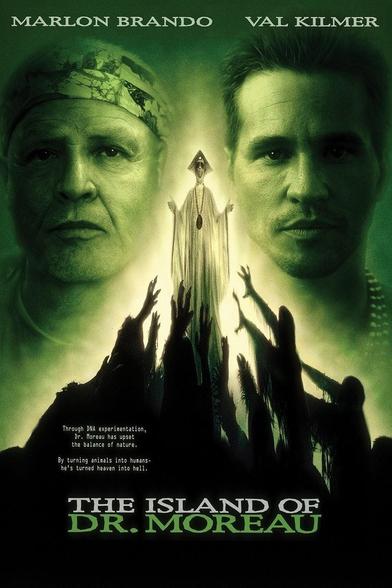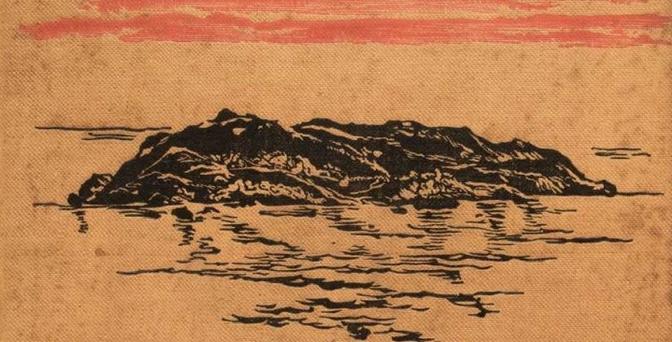‘The Island of Dr. Moreau’ Thrills and Chills With Ease
The Island of Dr. Moreau (1896) by H. G. Wells aims for the heart of 19th-century scientific thinking. Horrifying and thought-provoking, The Island of Dr. Moreau takes up the mantle of Mary Shelley’s Frankenstein (1812) to explore the limits of what defines humanity. Wells packs the story with action, scientific exploration, and social commentary in a way perhaps not possible today. The Island of Dr. Moreau remains a benchmark of SF storytelling.
Edward Pendrick’s ship, the Lady Vain sinks and he is the sole survivor. Alone and adrift in a dinghy, it is only by sheer chance that a passing ship, the Ipecacuanha, rescues him. Delirious from thirst and hunger, Pendrick is insensible for days.
After regaining his strength Pendrick meets his rescuer, Montgomery, and his grotesque servant, M’ling. Pendrick is grateful, however, Montgomery and M’ling make him uneasy. When the Ipecacuanha reaches an unmarked island Pendrick is forced overboard by the captain. Montgomery takes pity on Pendrick once more to save him.
Once on the island, things become even stranger. The people of the island, are a collection of misshapen and hideous beings. Pendrick is at once repelled and fascinated by the creatures. But it isn’t until he meets the enigmatic Dr. Moreau that Pendrick truly comes to understand the meaning of horror.
H. G. Wells is one of the foundational authors of science fiction. His works are seminal reading for any SF fan. Wells’ second published novel, The Island of Dr. Moreau comprises everything that makes his writing so memorable. Remarkable situations, intense action, and clever twists combined to make a visceral reading experience.
The Island of Dr. Moreau is the memoir of Edward Pendrick’s life during the year he was shipwrecked on Moreau’s island. Wells does a wonderful job of bringing Pendrick’s voice to life. Pendrick’s initial revulsion and dread are palpable. When fear gives way to a kind of understanding the reader feels it as well.
However, Pendrick is always off balance. His ideas shift one way and then the other. This is primarily due to Montgomery. Montgomery constantly gives reasonable explanations for unreasonable events and situations. This has the effect of quelling Pendrick’s rising anxiety for a time. Until the next event, that is.
Pendrick’s anxiety and fear are intensified when he finally meets the enigmatic Dr. Moreau. It turns out Pendrick knows of Moreau and his life in London. Moreau’s explanation for the events of his earlier life and move to the island seem logical but are unconvincing to Pendrick. Again, Moreau’s attempt to spin events serves to highlight the deviousness of the truth.
The climax of The Island of Dr. Moreau occurs quite early in the story, however, there is a long denouement that holds the reader’s interest. Through the denouement Pendrick watches the social structure of the island’s citizens collapse. Wells provides an apocalypse in miniature.
As much as The Island of Dr. Moreau thrills, there is a lack of deep characterization. This is perhaps because of the time at which the story was written. Pendrick is a gentleman, Montgomery is a dipsomaniac, and Moreau is a scientist. Wells relies on his readers’ knowledge of their stereotypes to fill any gaps. It’s not necessarily a bad idea, however, modern readers will have different ideas of what this means so they need to adapt accordingly.
The Island of Dr. Moreau is also an examination of class and race. The ‘people’ of the island serve as replacements of various class distinctions and races. This allows Wells to comment on how society treats and interacts with these people without being direct. Wells tries to make the flaws of society apparent but doesn’t fully succeed.
H. G. Wells (1866-1946)
In the end, The Island of Dr. Moreau is a wonderfully rich and complex story that bridges both science fiction and horror. Perhaps in a way not seen since Mary Shelley’s Frankenstein (1812). In both cases, they explore how science and society interact and react to each other.
The Island of Dr. Moreau‘s influence cannot be underestimated. Its effects are seen in the many stories about ‘uplifted’ animals or moreaus, and in the SF of artificial intelligence. Regardless of the vessel, the goal is to improve the human condition through artificial means.
Along with The Invisible Man (1897) and The War of the Worlds (1898), I consider The Island of Dr. Moreau part of the ultimate trinity of Wells’ works. Wells’ later works are more refined and polished but The Island of Dr. Moreau is raw creativity unbridled. Wells’ passion for his subject comes through on every page.
There are many reasons to read The Island of Dr. Moreau, however, one is paramount. There is no other work in Wells’ long career that has the emotional and intellectual impact of The Island of Dr. Moreau. The Island of Dr. Moreau will leave you thrilled, unsettled, and wanting more.
#BookReview #HGWells #TheIslandOfDrMoreau













